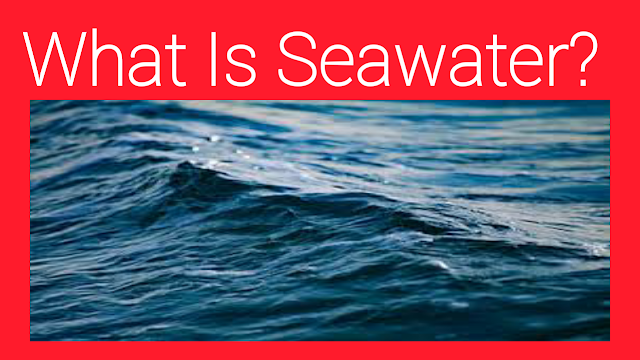What Is Sea Water?
The water of the sea or the ocean is known as seawater. The average salinity of seawater is almost 3.5%. It means that if you have one kilogram of seawater, it has almost 35 grams of dissolved salts. Moreover, seawater is also denser than freshwater. The density of the freshwater is 1.0 kg/L. On the other hand, the density of seawater is 1.25 kg/L. Its reason is that seawater has dissolved salts and these dissolved salts increase the density of the seawater. Due to enough concentration of the dissolved salts in the seawater, the freezing point of seawater also decreases. That’s why seawater decreases at -2 °C. On the other hand, freshwater freezes at 0 °C. Now, a question comes to the minds of the people ‘Why is the seawater salty?’. To understand the impacts of the salinity of seawater, we have to understand the water cycle.
You may also like to read:
What Is the Water Cycle?
The water cycle provides us with an idea about the continuous movement of the water on the surface of the earth. The amount of water on earth is constant. Anyhow, water is present on the earth in different forms like freshwater, atmospheric water, saline water, etc. The forms of the water vary the basis on the climatic variables. It means that water moves from one reservoir to another i.e. from the ocean to the atmosphere, from the atmosphere to the rivers, and from rivers to the ocean again. The physical appearance of the water changes by various processes like evaporation, condensation, and surface runoff, etc. That’s why water is also present in liquid, gas, and vapor forms.
Why Is The Sea Water Salty?
If you have ever visited any sea and you have tasted seawater, you would know that seawater is salty. Moreover, you also know that freshwater in the form of rain, rivers, and ice cubes is not salty. Now, a question comes to your mind ‘Why is the seawater salty whereas other water doesn’t?’. There are two clues behind this fact. First of all, we discuss the first clue. As we have discussed earlier that due to the water cycle, water changes its forms. Let’s start with the water that is present in the ocean. As the water in the oceans is present at a wide scale. Therefore, water on the surface of the oceans easily evaporates and goes into the atmosphere. In the atmosphere, this water condenses and it falls on the earth in the form of rain and snowfall. During the summer, the snow in the mountains changes into water and this water started to flow on the earth in the form of rivers. When these rivers pass through rocks, they dissolve minerals and this process is called weathering. These minerals along with the water of the river flow towards oceans and these minerals add into the ocean. As a result, seawater is salty.
Why Water of the River is Not Salty?
Now, lots of questions also come to your mind. The first question is ‘Why water of rivers is not salty’. The answer to this question is that in the rivers, there is a low concentration of the minerals, therefore, we can’t taste salt. The second question is that ‘If water of rivers is added into the ocean, why seawater is salty but the water of rivers is not salty?’. The answer to this question is that rivers are adding their water into the oceans for millions of years and the ocean is also evaporating the water from its surface for millions of years. During the evaporation process, only water from the surface of the oceans is evaporated and minerals don’t evaporate because these minerals are heavier than water. Therefore, the amount of minerals is constantly increasing in the oceans. That’s why the seawater is salty whereas the water of the rivers is not salty.
Second Clue About It
Now, we discuss the second clue. The second clue is that seawater is salty due to the presence of the salt lakes like the Great Salt Lake and the Dead Sea. These lakes are known as 10 times saltier than the seawater. Now, a question also comes to the minds of the people ‘Why these lakes are saltier whereas other lakes don’t?’. The answer to this question is that a lake is known as a temporary storage area for water. It means some rivers and streams bring water to these lakes and other rivers carry the water out of these lakes. It means that in a lake water enters into one end and it flows towards another end. In the case of the Great Salt Lake and the Dead Sea, there is no outlet for the water. It means that in these lakes, water can only enter but it can’t come out to another end. Therefore, the only way to escape water from these lakes is evaporation. When seawater evaporates into the atmosphere, it leaves behind the minerals. These minerals have been added to these lakes for millions of years. That’s why these lakes are saltier than the other lakes. The same phenomenon is happening in the case of seawater.
Why Does The Ocean Appear Blue?
While discussing the salty seawater, another question comes to our minds ‘Why does the ocean appear blue whereas pure water in the glass is colorless?’. Most people think that it is due to the presence of salt in the ocean. It is a wrong belief because the phenomenon of the blue color of the ocean is similar to the phenomenon of the blue color of the sky. To know the basic phenomenon behind the blue color of the sky, you can read our post ‘Why the color of the sky is blue?’. Anyhow, it is due to the scattering of the sun’s light from the surface of the ocean. The sun’s light is white and it consists of seven colours of different wavelengths. When this light falls on the surface of the ocean, water observes red, orange, and yellow lights whereas it reflects the blue color of the light. That’s why the ocean appears blue.









